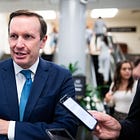Life on Mars, dance of death, property is theft: Weekend reads for July 13, 204
The links worth your time this weekend
Last June, four astronauts entered NASA’s Crew Health and Performance Exploration Analog (CHAPEA), a sealed environment at the agency’s Houston headquarters built to simulate the experience of isolation on Mars. They emerged last weekend, having — we assume — learned a lot about the possibilities of living in space, but they’ve certainly missed a whole lot here over the past year, and are doubtless having a hard time catching up on everything. It’s been hard enough keeping up with that on a day-to-day basis!
Unless you’ve also been living in a Mars colony simulation, there’s no avoiding it — this week has been dominated by coverage of the continuing debate over Joe Biden’s fitness and how that affects the chances of a Democratic victory in November, something that nobody wants to leave to chance. There are of course no easy answers, but we spent some time this week, among other things, digging into the issue with some of the smartest and best-informed people we know — in the Senate and the Cabinet — and we’ve turned the question over to you as well.
And to wrap up the week, as we do each weekend for our paid subscribers we’ve collected some links to pieces that we think are well worth spending some time with this weekend. Did you realize that the 2000 Bush v. Gore Supreme Court decision handed states the plenary (that’s legal lingo for “indisputable”) power to override voters’ right to choose the president? People are working on the issue, and we’ve found a good piece that explores what’s at stake, and what fixes are possible. Also below, you’ll find a photo essay on how LGBTQ+ people in Japan are fighting back against homophobic public sentiment with elaborate wedding photography, an in-depth exploration of how human beings stopped looking at land possession as theft of the commons and started accepting the idea of personal property, an essay on how the tech industry has finally figured out how to find everyone’s price, and much more.
As always, we hope the articles we’ve collected inspire and entertain you, and even give you some hope for the future.
In case you missed it
We checked in with author and activist George Monbiot to talk about his new book (with Peter Hutchison), Invisible Doctrine, a history of capitalism, an exposé of neoliberalism (that’s the doctrine in question), and a manifesto for the future, meant to upset the “fairy tale” that’s kept human focused on growth and efficiency rather than flourishing. You’ll want to give the interview (and the book) a read.
We had a great live conversation with Senator Chris Murphy of Connecticut, covering what’s at stake with the President, how he’s been working across the aisle to address the root causes of America’s epidemic of unhappiness, and why politics in the U.S. has moved so far from the ideas that can give people purpose and meaning — and how to get that back. If you didn’t get a chance to join the call, we encourage you to give it a listen.
Secretary of Transportation Pete Buttigieg joined us for another intriguing conversation, covering his experience of working with the president, his belief that infrastructure work — fixing the broken things that deprive people of freedom in their everyday lives — is part of the long game against fascism, and how the meaning of fatherhood and being a man is changing in the 21st century.
We closed out the week with a conversation with podcaster Yowei Shaw, who’s turned her experience of being laid off — and being left to negotiate the consequences on her own — led to a new show that connects people with the resources to help them deal with not just layoffs, but all the varied stresses of life during late capitalism.
A request for those who haven’t yet joined us: The interviews and essays that we share here take research and editing and much more. We work hard, and we are eager to bring on more writers, more voices. But we need your help to keep this going. Join us today to support the kind of independent media you want to exist.
Readings
How to ensure the right to vote for president
The danger of the plenary power theory is not just the lawlessness and violence of the Trump coup, or the chance that a legislature would usurp the citizens’ right to vote for president. If state power over presidential elections is “plenary,” states can get away with less dramatic but equally authoritarian steps to override the will of the public. [Balls and Strikes]








